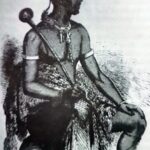SUMAN, ALMAMY
- 3 Min Read
Almamy Suman (circa 1810-1905) was the ruler of the Wara Wara Limba in the 19th century. Like many northern chiefs, his country was severely affected by the aggressive activities of the Sofa, warriors of the Mandinka emperor Samori Toure. Despite a treaty of friendship with the British, his area of jurisdiction was much decreased by the turmoils of the Sofa invasions.
He was born in the early 19th century, a member of the Limba Mansaray clan, descended from Ba Foday Mansaray, founder of Bafodea, then capital of the Wara Wara Limba state. He had started to rule by the middle of the century, and in the 1870s led his people in collaboration with the Hub (Fula rebels south of Futa Jallon, in what is now the Republic of Guinea) against the Yalunka state of Solimana in the far northeastern corner of Sierra Leone.
When, in the ‘course of his wars of expansion, Samori’s forces reached the Sierra Leone hinterland, Almamy Suman prudently submitted to the Sofa rather than have his country destroyed. In 1886, he joined another powerful Limba ruler, Almamy Suluku, to petition the British for assistance in securing the trade routes which had been affected by Samori’s campaigns. By 1889, the British colonial government was making moves to sign treaties with more distant rulers in the hinterland, and a treaty of friendship was signed with Almamy Suman as ruler of all the Wara Wara, in 1890.
By this time, the Sofa had recaptured the northeastern part of Sierra Leone which had rebelled against Samori in 1889, and reclaimed it as part of his empire. Sofa activities in Suman’s country made him intensely hostile towards them. When Sayo of Kaliere (formerly in the Solima state) fled from the Sofa to take refuge with Suman at Bafodea, the latter closed the trade route to Freetown through his country as a way of revenging himself on the invaders.
The aftermath of the Sofa invasion created unrest which greatly reduced the area under Almamy Suman’s rule. Some of his sub-chiefs sided with the Sofa against him in order to secure their independence. The Limb of Bongobong and Kakrima are examples. After the Sofa had left, the Bongobong Limba, determined to be free of his rule, enlisted the help of mercenaries to fight against him.
When the British took over the hinterland as a Protectorate in 1896, Bongobong and Kakrima were regarded as independent of Suman and made separate chiefdoms. Greatly reduced in authority and weakened by the upheavals of the 1880s and 1890s, Almamy Suman died in 1905.
C. MAGBAILY FYLE.



